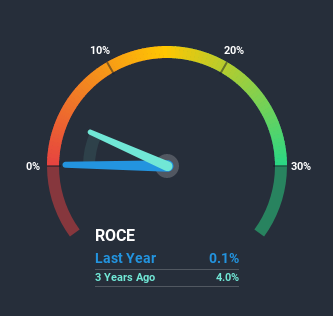- South Korea
- /
- Auto Components
- /
- KOSDAQ:A038110
Does Ecoplastic's (KOSDAQ:038110) Returns On Capital Reflect Well On The Business?
If we're looking to avoid a business that is in decline, what are the trends that can warn us ahead of time? A business that's potentially in decline often shows two trends, a return on capital employed (ROCE) that's declining, and a base of capital employed that's also declining. Ultimately this means that the company is earning less per dollar invested and on top of that, it's shrinking its base of capital employed. So after glancing at the trends within Ecoplastic (KOSDAQ:038110), we weren't too hopeful.
Return On Capital Employed (ROCE): What is it?
For those that aren't sure what ROCE is, it measures the amount of pre-tax profits a company can generate from the capital employed in its business. To calculate this metric for Ecoplastic, this is the formula:
Return on Capital Employed = Earnings Before Interest and Tax (EBIT) ÷ (Total Assets - Current Liabilities)
0.0012 = ₩217m ÷ (₩617b - ₩436b) (Based on the trailing twelve months to September 2020).
Therefore, Ecoplastic has an ROCE of 0.1%. Ultimately, that's a low return and it under-performs the Auto Components industry average of 4.2%.
Check out our latest analysis for Ecoplastic

Historical performance is a great place to start when researching a stock so above you can see the gauge for Ecoplastic's ROCE against it's prior returns. If you want to delve into the historical earnings, revenue and cash flow of Ecoplastic, check out these free graphs here.
What The Trend Of ROCE Can Tell Us
The trend of returns that Ecoplastic is generating are raising some concerns. To be more specific, today's ROCE was 4.3% five years ago but has since fallen to 0.1%. In addition to that, Ecoplastic is now employing 24% less capital than it was five years ago. When you see both ROCE and capital employed diminishing, it can often be a sign of a mature and shrinking business that might be in structural decline. If these underlying trends continue, we wouldn't be too optimistic going forward.
While on the subject, we noticed that the ratio of current liabilities to total assets has risen to 71%, which has impacted the ROCE. If current liabilities hadn't increased as much as they did, the ROCE could actually be even lower. What this means is that in reality, a rather large portion of the business is being funded by the likes of the company's suppliers or short-term creditors, which can bring some risks of its own.
The Bottom Line
In summary, it's unfortunate that Ecoplastic is shrinking its capital base and also generating lower returns. It should come as no surprise then that the stock has fallen 16% over the last five years, so it looks like investors are recognizing these changes. With underlying trends that aren't great in these areas, we'd consider looking elsewhere.
Since virtually every company faces some risks, it's worth knowing what they are, and we've spotted 4 warning signs for Ecoplastic (of which 1 shouldn't be ignored!) that you should know about.
While Ecoplastic isn't earning the highest return, check out this free list of companies that are earning high returns on equity with solid balance sheets.
When trading Ecoplastic or any other investment, use the platform considered by many to be the Professional's Gateway to the Worlds Market, Interactive Brokers. You get the lowest-cost* trading on stocks, options, futures, forex, bonds and funds worldwide from a single integrated account. Promoted
Mobile Infrastructure for Defense and Disaster
The next wave in robotics isn't humanoid. Its fully autonomous towers delivering 5G, ISR, and radar in under 30 minutes, anywhere.
Get the investor briefing before the next round of contracts
Sponsored On Behalf of CiTechValuation is complex, but we're here to simplify it.
Discover if Ecoplastic might be undervalued or overvalued with our detailed analysis, featuring fair value estimates, potential risks, dividends, insider trades, and its financial condition.
Access Free AnalysisThis article by Simply Wall St is general in nature. It does not constitute a recommendation to buy or sell any stock, and does not take account of your objectives, or your financial situation. We aim to bring you long-term focused analysis driven by fundamental data. Note that our analysis may not factor in the latest price-sensitive company announcements or qualitative material. Simply Wall St has no position in any stocks mentioned.
*Interactive Brokers Rated Lowest Cost Broker by StockBrokers.com Annual Online Review 2020
Have feedback on this article? Concerned about the content? Get in touch with us directly. Alternatively, email editorial-team (at) simplywallst.com.
About KOSDAQ:A038110
Ecoplastic
Engages in the research, development, production, and sale of automotive plastic parts in South Korea.
Moderate risk unattractive dividend payer.
Market Insights
Weekly Picks

THE KINGDOM OF BROWN GOODS: WHY MGPI IS BEING CRUSHED BY INVENTORY & PRIMED FOR RESURRECTION


Why Vertical Aerospace (NYSE: EVTL) is Worth Possibly Over 13x its Current Price


The Quiet Giant That Became AI’s Power Grid
Recently Updated Narratives


MINISO's fair value is projected at 26.69 with an anticipated PE ratio shift of 20x


Fiverr International will transform the freelance industry with AI-powered growth

Stride Stock: Online Education Finds Its Second Act
Popular Narratives


MicroVision will explode future revenue by 380.37% with a vision towards success


Crazy Undervalued 42 Baggers Silver Play (Active & Running Mine)





